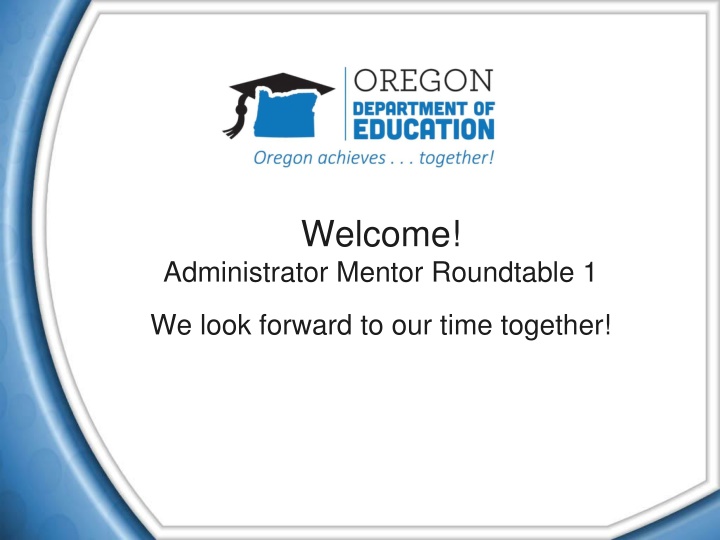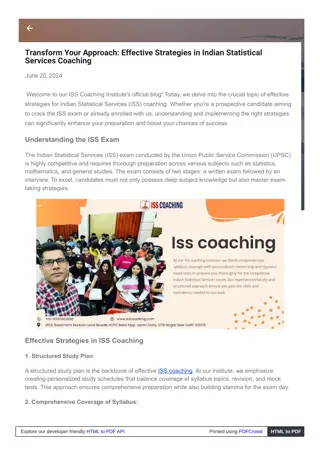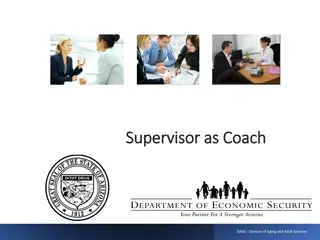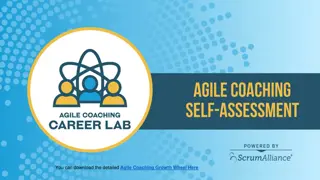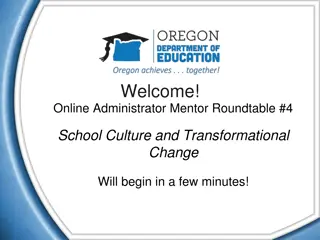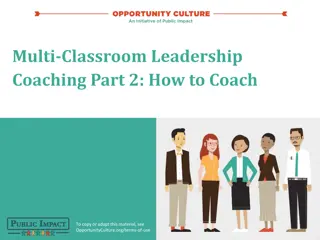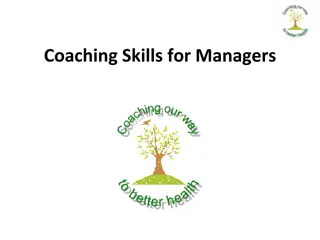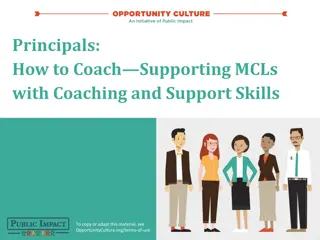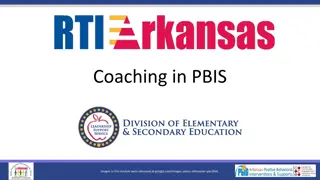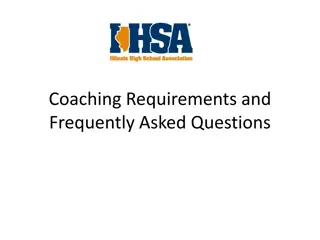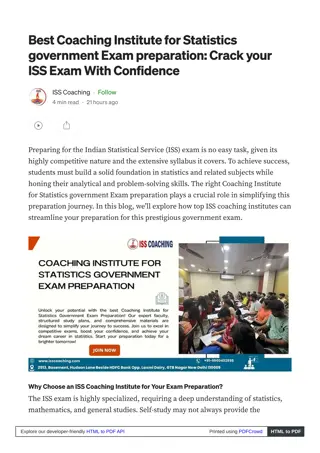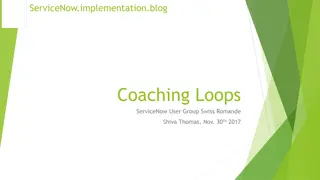Online Administrator Mentor Roundtable: Coaching for Time Management & Systems Change
Join the Online Administrator Mentor Roundtable where facilitators and participants collaborate in a unique social and virtual network to enhance professional learning. Explore topics like time management, systems change, and norms for online collaboration. Engage in discussions, share experiences, and grow together in a safe and confidential environment.
Download Presentation

Please find below an Image/Link to download the presentation.
The content on the website is provided AS IS for your information and personal use only. It may not be sold, licensed, or shared on other websites without obtaining consent from the author.If you encounter any issues during the download, it is possible that the publisher has removed the file from their server.
You are allowed to download the files provided on this website for personal or commercial use, subject to the condition that they are used lawfully. All files are the property of their respective owners.
The content on the website is provided AS IS for your information and personal use only. It may not be sold, licensed, or shared on other websites without obtaining consent from the author.
E N D
Presentation Transcript
Welcome! Administrator Mentor Roundtable 1 We look forward to our time together!
Lets Begin Administrator Mentor Roundtable 1 Welcome and Introductions Tanya Frisendahl,ODE Ruth McDonald, Online Technology Facilitator Janis Duer, Facilitator Carol Middleton, Facilitator Roll Call, Participants Please put first and last name in Chat Box Connector: Celebrating Successes! Think about and be ready to share out in a word or phrase you grateful for in your Administrator Mentor work?
Oregon Grown Administrator Mentor Professional Learning Community New format In Person and Online Learning Roundtables Participant Agenda and Time Management Grid sent via email for today s session Materials will be posted on the ODE Website: http://www.oregon.gov/ode/schools-and- districts/grants/mentoring/Pages/default.aspx
Norms for Collaboration for Online Professional Learning In an online environment, facilitators and participants create a unique social world and virtual network that decentralizes and enriches the process of learning. While everyone has varying levels of comfort and ease with using technology, online professional learning requires some of the same collaborative norms as in-person learning. It also requires some norms specific to our online environment. Honor online meeting commitments: Arrive on time and participate fully until the meeting is over. Respectful Use of Electronics: Make an effort to learn to use the technology for online collaboration, and to ask for help if needed. Use computer/tablet for note taking, if you d like, but please disconnect from email so you can better connect with colleagues and content during our meeting. Equity of Voice: Hear all voices. Provide opportunities for others to speak Active Listening: Truly listen to what people are saying, rather than thinking about how you will respond. Fully engage in online conversations, practice active listening, and respond verbally and/or in the chat box when asked. Respect for all perspectives: We all have different experiences and come with different perspectives Safety and Confidentiality: Our purpose is to learn how to support each other and maintain professionalism. This sets a context of safety share ideas and grow. Confidentiality honors those who are not in the room.
Online Administrator Mentor Roundtable #1
Roundtable #1 Coaching For Time Management & Systems Change
Prior Knowledge Reflect on your first job as an administrator. What were your some of your biggest time management issues?
Top Time Management Issues Let s take a poll: Select your top 3 time management issues on the Time Management Poll.
Time Management and Systems Change Many beginning school leaders struggle with time management. The daily demands of a principal are overwhelming and can inhibit focusing on the bigger picture making a difference for students. Stephen Covey, author of Seven Habits of Highly Effective People, provides a useful framework to help leaders analyze their use of time and organize priorities. The framework can also be used to think about the relationship between leading systems change and managing time. The role of the mentor is to try and move coaching conversations beyond immediate problems to those underlying opportunities for systems improvement that are likely to have the greatest impact on students. Adapted from Blended Coaching, Chapter 12, Coaching for Systems Change
Todays Objectives Become knowledgeable in the basic principles of Covey s Time Management Grid and its implications for systems change. Examine a time management issue that your mentee may be experiencing and its systemic cause. Develop strength in participating in an online professional learning community.
Coveys Time Management Grid Stephen Covey suggests that our time is spent in four kinds of activities, as illustrated in his Four Quadrants. The Four Quadrants are organized by urgency and importance.
Coveys Time Management Grid And Most of us spend too much time on what is urgent and not enough time on what is important. Stephen Covey
Coveys Time Management Grid URGENT NOT URGENT IMPORTANT Quadrant I: Urgent & Important Immediate and important deadlines Crisis Pressing problems Deadline driven Quadrant II: Not Urgent & Important Long-term strategizing and development Prevention Relationship building Planning Recognizing new opportunities NOT Quadrant III: Urgent & Not Important Time pressured distractions; not really important, but someone wants it now Interruptions Some email, reports, and meetings Proximate, pressing matters Quadrant IV: Not Urgent & Not Important Activities that yield little if any value Trivia, busy work Personal social media Some phone calls Time wasters IMPORTANT Source: Stephen Covey, 7 Habits of Highly Effective People
Reflect on your mentee Quadrant I: Urgent & Important Quadrant II: Not Urgent & Important Quadrant III: Urgent & Not Important Quadrant IV: Not Urgent & Not Important Source: Stephen Covey, 7 Habits of Highly Effective People
Reflecting on your mentee What have you noticed about the amount of time, and types of activities, that are in each quadrant? Jot down your observations and get ready to pair share.
Time Management and Systems Change School leaders often become stuck in a cycle of responding to urgent issues, both important and not important. Systems solutions, on the other hand, are almost never urgent and are almost always important. A critical role for the coach, then, is to help the coachee carve out the time and the psychological space in which to do the important but not urgent work (Quadrant II) of identifying and implementing the structural interventions that will make a true and lasting difference for students. Adapted from Blended Coaching, Chapter 12, Coaching for Systems Change
What are systems? When a school has planned, communicated, and implemented the specific ways processes will work, we can say that a proactive systemic approach is taken. Blended Coaching, Chapter 12, Coaching for Systems Change
Systemic Factors Review the presenting problem on the next slide. What might be a systemic cause that could be contributing to the time management issue?
Presenting Problem Issue The principal is stressed about never having enough time to complete tasks or projects. Superficial Cause She is currently spending 60 minutes a day supervising lunch recess. She is also processing several discipline referrals each day which involves speaking with students and parents. Systemic Cause ? Blended Coaching, Chapter 12, Coaching for Systems Change
Summary The mentor can help the mentee with time management and systems solutions by carving out more time in Quadrant II and by Sharing the Time Management Grid to help the mentee become more aware of how he/she is using time and the value of Quadrant II activities. Asking facilitative questions to help your mentee look behind any presenting problems (issues) to the underlying or systemic cause. Investing in systems improvement rather than staying stuck in short term solutions.
Reflect & Apply Think back about the reflection you did earlier on your mentee s activities, using the Time Management Grid. What might be one time management issue that you could explore more deeply with your mentee in terms of a systems change? What might be an entry point for this conversation? Jot down your ideas on on the Participant Agenda.
Remember... The key is not to prioritize what s on your schedule, but to schedule your priorities. Stephen Covey
Additional Resources Article Marshall, K. (2008) The Big Rocks: Priority Management for Principals https://www.marshallmemo.com/articles/Time%20Management%20PL%20Mar %2008.pdf e-Book Short on Time: How Do I Make Time to Lead and Learn as a Principal? http://www.ascd.org/Publications/Books/Overview/Short-on-Time.aspx
Admin. Mentor Grant Business Check-In Program Updates Mentor logs/hour and analysis of logs Local Business Closure and gratitude
